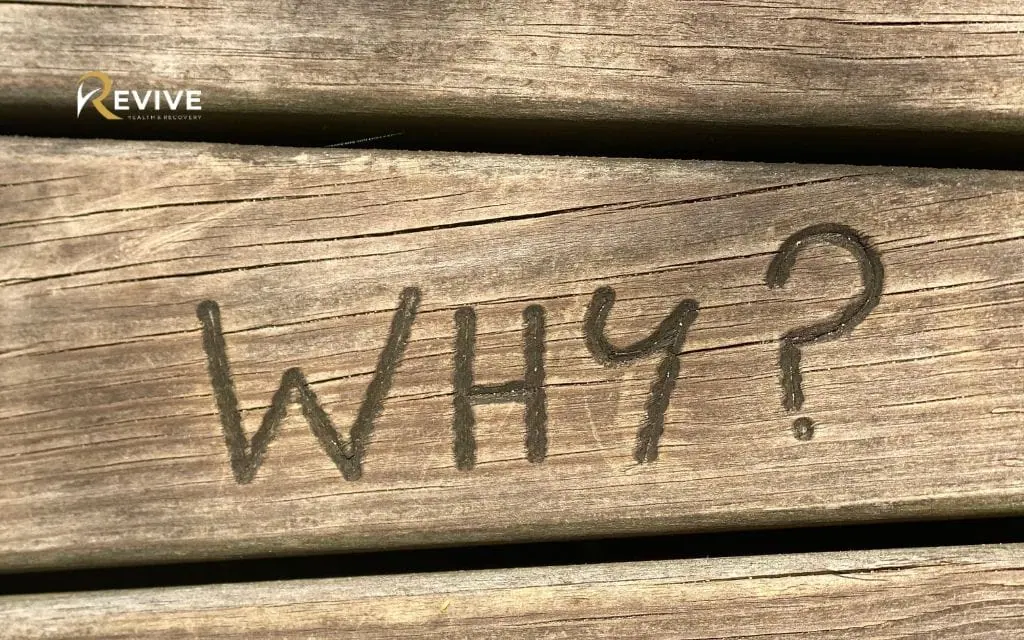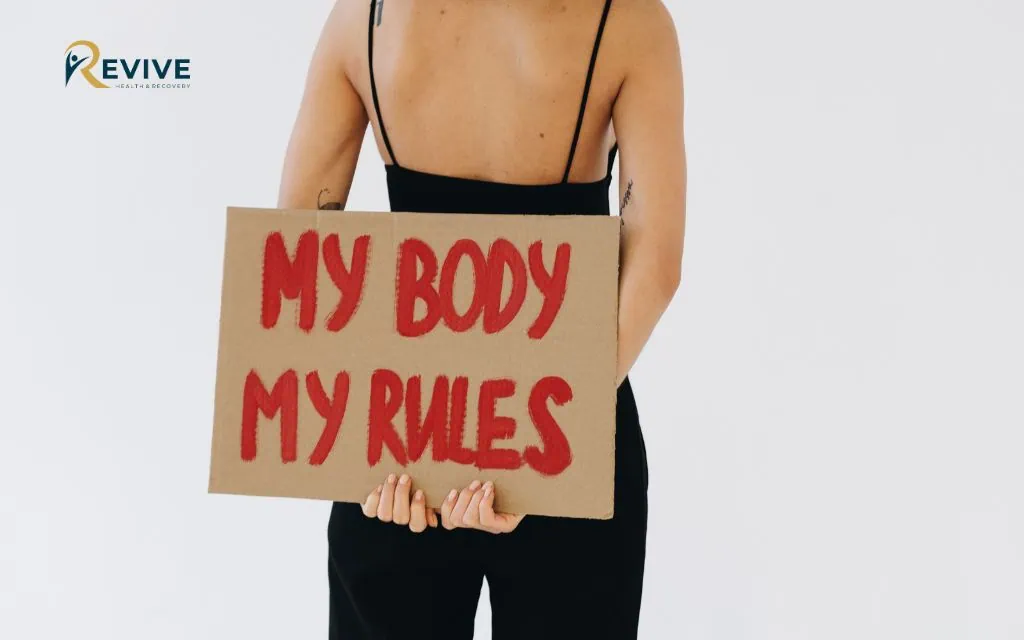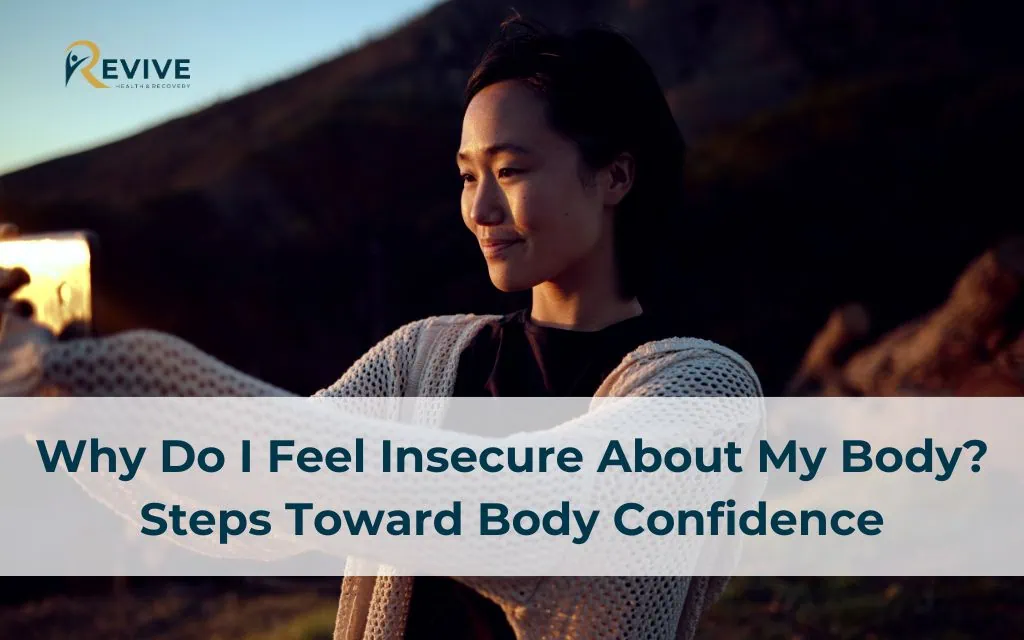“Why do I feel insecure about my body?” This question plagues approximately 80% of women and up to 30% of men in the United States. If you’ve looked in the mirror and felt shame or dissatisfaction, you’re not alone – especially in Colorado where our active outdoor culture can sometimes intensify body image concerns.”
The question “why do I feel insecure about my body” stems from a complex mix of psychological, social, and neurological factors. Understanding these elements marks the first step toward healing your relationship with your body. At Revive Health Recovery, we recognize that when you ask yourself “why do I feel insecure about my body,” it connects deeply to overall mental wellness, and we’re here to help you navigate this journey.
Whether you experience occasional thoughts like “why do I feel insecure about my body” or struggle with persistent body image issues, this article will help you understand these feelings and provide practical steps toward body acceptance.
Need immediate support for body image concerns? Call Revive Health Recovery at (303) 268-4655 for lifting mood naturally compassionate guidance.
The Science Behind Body Insecurity: Why Our Brains Focus on Flaws
The Neurological Basis of Body Image
When you wonder “why do I feel insecure about my body,” understand that your perception doesn’t just involve thoughts – it’s actually wired into your brain. Research shows that the parietal cortex plays a crucial role in how we construct our body image. This neurobiological component explains why asking “why do I feel insecure about my body” is so common and why these feelings can be so persistent.
The connection between body perception and emotional processing creates a feedback loop. When you look in the mirror and think “why do I feel insecure about my body,” your brain processes what you see through filters shaped by past experiences, cultural messages, and emotional associations. This explains why two people can look at the same reflection yet perceive it completely differently.
Studies on neural mechanisms reveal that body image distortion involves actual differences in brain activity. These feelings of “why do I feel insecure about my body” aren’t “just in your head” – they’re a real neurological experience that requires understanding and targeted approaches to address.
Why Evolution May Have Primed Us for Comparison
Our ancestors’ survival depended on social acceptance. Evolution wired us to be hyper-aware of how we compare to others in our social groups. In prehistoric times, rejection from the group could mean death, so our brains developed sophisticated social comparison mechanisms.
The problem? Our brains haven’t caught up with modern body ideals. We still operate with stone-age social comparison software in a digital world where images are manipulated, filtered, and carefully curated. This evolutionary mismatch helps explain why you might ask yourself “why do I feel insecure about my body” despite logical awareness that social media images aren’t realistic.

The Psychological Components of Body Insecurity
Thoughts like “why do I feel insecure about my body” intertwine deeply with self-esteem and self-worth. Many people mistakenly believe that achieving a certain appearance will bring happiness or worthiness. This mindset creates a conditional relationship with self-acceptance that’s difficult to satisfy.
Cognitive distortions maintain negative body image through patterns like:
- All-or-nothing thinking (“If I’m not perfectly fit, I’m completely out of shape”)
- Mental filtering (focusing exclusively on perceived flaws)
- Catastrophizing (“Everyone notices and judges this aspect of my appearance”)
Past experiences, particularly from childhood and adolescence, shape current body perception. A seemingly minor comment from years ago can echo through your current self-image, creating lasting impressions that make you wonder “why do I feel insecure about my body” years later.
What Causes Body Insecurity? Understanding the Root Factors
External Influences That Shape Body Image
Media and unrealistic beauty standards bombard us daily. The average American sees thousands of advertisements daily, many featuring idealized body types that are unattainable for most people without extreme measures, digital manipulation, or both. These influences can leave you questioning “why do I feel insecure about my body” despite knowing better.
Social media intensifies these pressures. Research shows that reducing social media use by 50% can significantly improve body image in just a few weeks. Platforms like Instagram and TikTok create especially challenging environments for maintaining body confidence, often triggering thoughts of “why do I feel insecure about my body” after just minutes of scrolling.
Here in Colorado, our fitness-focused culture presents unique challenges that can make you wonder “why do I feel insecure about my body” more frequently. The emphasis on outdoor activities, athletics, and physical performance can create additional pressure. The higher altitude in Denver even affects body composition and metabolism, creating different body image challenges than in other regions.
Family and Early Life Experiences
Childhood experiences lay the foundation for body image. Studies reveal that 40-50% of children ages 6-12 already report body insecurity. Offhand comments from family members about weight, shape, or eating habits can create lasting impressions that lead to asking “why do I feel insecure about my body” well into adulthood.
Parental modeling significantly influences how children view their bodies. Children observe how parents talk about and treat their own bodies, internalizing these attitudes and behaviors long before they can critically evaluate them.
Weight-based teasing and bullying during formative years creates lasting psychological wounds. These experiences correlate strongly with later development of body image issues, eating disorders, and thoughts of “why do I feel insecure about my body” that persist for years.
Personal History and Life Changes
Major body changes throughout life – puberty, pregnancy, aging, weight fluctuations – can trigger or intensify thoughts of “why do I feel insecure about my body.” Our bodies naturally change throughout our lives, yet many people struggle to update their body image accordingly.
Medical conditions and disabilities introduce additional complexity to body image. Managing conditions that affect appearance or function requires additional emotional and psychological resources and may intensify questions like “why do I feel insecure about my body.”
Trauma, particularly physical or sexual trauma, profoundly impacts body perception and acceptance. The body becomes associated with vulnerability or violation, creating complex layers of disconnection and distrust that require specialized, trauma-informed approaches to heal thoughts of “why do I feel insecure about my body.”
Signs You’re Struggling with Negative Body Image
Common Thought Patterns
Excessive comparison indicates body image struggles. If you frequently compare your appearance to others – whether strangers, friends, or celebrities—and wonder “why do I feel insecure about my body,” this suggests body insecurity has taken root.
Persistent negative self-talk about appearance manifests in harsh inner dialogue about your body. This critical inner voice might use language you would never direct toward others yet seems acceptable to use against yourself, constantly reinforcing thoughts of “why do I feel insecure about my body.”
Attributing life problems to physical appearance reflects a cognitive distortion that body image issues often create. This pattern leads to thoughts like, “If my body looked different, I would be happier/more successful/more loved,” which places impossible expectations on physical appearance and deepens feelings of “why do I feel insecure about my body.”
Behavioral Indicators
Body checking behaviors like frequent mirror checking, pinching flesh, or constantly seeking reassurance about appearance indicate body image issues. Approximately 23% of U.S. adult women report these behaviors, which reinforce rather than relieve thoughts of “why do I feel insecure about my body.”
Avoidance behaviors – hiding certain body parts with clothing, avoiding photos, declining social invitations due to appearance concerns – signal significant body image distress and often stem from persistent thoughts of “why do I feel insecure about my body.”
Social withdrawal represents a serious consequence of body insecurity. When questions like “why do I feel insecure about my body” prevent participation in meaningful activities or relationships, body image issues have begun affecting overall quality of life.
When Body Insecurity Becomes More Serious
Warning signs of body dysmorphic disorder include obsessive preoccupation with perceived flaws, excessive grooming, seeking repeated reassurance, and significant distress that interferes with daily functioning. This condition affects approximately 2-3% of the population and requires professional treatment for thoughts like “why do I feel insecure about my body.”
The connection between body image and eating disorders is strong. Constant thoughts of “why do I feel insecure about my body” often precede disordered eating patterns, and interestingly, body image concerns are frequently the last aspect to improve in eating disorder recovery.
Professional help becomes necessary when thoughts of “why do I feel insecure about my body” cause significant distress, interfere with daily activities, lead to unhealthy behaviors, or accompany depression or anxiety. At Revive Health Recovery, we specialize in addressing these complex issues through evidence-based treatment approaches.

Evidence-Based Strategies to Improve Body Image
Cognitive Approaches to Body Acceptance
Cognitive Behavioral Therapy (CBT) techniques effectively address thoughts of “why do I feel insecure about my body” by identifying and challenging distorted thoughts about appearance. This approach has strong research support and forms a cornerstone of treatment at Revive Health Recovery.
Mindfulness practices for body awareness help reconnect with your body as it exists in the present moment, rather than how you wish it would be. These practices build the capacity to observe thoughts like “why do I feel insecure about my body” without immediately accepting them as truth.
Positive affirmation strategies work when they feel believable and authentic. Rather than forcing yourself to love every aspect of your appearance immediately, start with neutral statements like, “My body allows me to experience life” or “I deserve respect regardless of my appearance” to counter thoughts of “why do I feel insecure about my body.”
Creating a Healthier Relationship with Social Media
Curate social media feeds deliberately to support body positivity. Follow accounts that feature diverse bodies, promote body acceptance, and focus on achievements beyond appearance to reduce thoughts of “why do I feel insecure about my body.”
Set boundaries around social media use through time limits, content filters, and regular digital detoxes. The impact of these boundaries can be surprisingly powerful—many clients report significant reductions in thoughts like “why do I feel insecure about my body” after implementing even modest changes.
Use social media as a tool for body acceptance by engaging with body-positive communities and content that challenges narrow beauty ideals. Transform your feed from a source of comparison and thoughts of “why do I feel insecure about my body” into a source of inspiration and support.
Building Body Respect Through Daily Practices
Focus on body functionality rather than appearance by appreciating what your body does for you, not just how it looks. This shift in perspective – from decorative to instrumental value – creates space for genuine appreciation and reduces thoughts of “why do I feel insecure about my body.”
Develop self-compassion practices to counter the harsh inner critic that fuels body insecurity. Treat yourself with the same kindness you would offer a friend struggling with thoughts of “why do I feel insecure about my body.”
Approach movement and exercise for enjoyment rather than appearance. Colorado offers abundant opportunities to connect with your body through enjoyable outdoor activities that celebrate what your body can do rather than triggering thoughts of “why do I feel insecure about my body.”
Denver Resources for Body Image Support
Professional Support Options in Colorado
Therapists specializing in body image issues provide crucial support for healing thoughts of “why do I feel insecure about my body.” Denver offers numerous qualified professionals trained in evidence-based approaches for addressing body insecurity.
Body image support groups in the Denver area create communities of understanding and growth. Shared experiences reduce isolation and normalize the challenges of questions like “why do I feel insecure about my body.”
Recovery and wellness centers like Revive Health Recovery offer comprehensive treatment approaches. Our center provides specialized expertise in addressing thoughts of “why do I feel insecure about my body” alongside other mental health challenges, creating integrated treatment plans that address the whole person.
For personalized guidance on body image concerns, call Revive Health Recovery at (303) 268-4655.
Community and Online Resources
Denver-based body positive communities foster connection and support beyond clinical settings for those wondering “why do I feel insecure about my body.” These groups organize events, workshops, and informal gatherings that celebrate body diversity and challenge harmful cultural narratives.
Colorado-specific online support forums address the unique aspects of body image in our region’s culture. These spaces acknowledge how Colorado’s outdoor emphasis and fitness culture create specific challenges around thoughts of “why do I feel insecure about my body.”
Books and podcasts recommended by Denver therapists provide additional resources for your journey beyond wondering “why do I feel insecure about my body.” Popular recommendations include “The Body Is Not an Apology” by Sonya Renee Taylor and “Body Kindness” by Rebecca Scritchfield.
Why Choose Revive Health Recovery for Body Image Support
Specialized Expertise in Body Image and Mental Health
Revive Health Recovery offers a unique approach to addressing thoughts of “why do I feel insecure about my body” that integrates current research with compassionate care. Our team understands the neurobiological, psychological, and social factors that contribute to body insecurity.
We integrate body image treatment with overall mental health care, recognizing that questions like “why do I feel insecure about my body” often connect to other challenges like anxiety, depression, or trauma. This integration creates more effective, lasting results.
Our evidence-based methodologies include Cognitive Behavioral Therapy, Acceptance and Commitment Therapy, and trauma-informed approaches that address the root causes of thoughts like “why do I feel insecure about my body” rather than just the symptoms.
Compassionate, Client-Centered Care
Revive creates a safe environment for vulnerability where you can explore thoughts of “why do I feel insecure about my body” without judgment or shame. This therapeutic alliance forms the foundation for meaningful change.
Personalized treatment planning addresses your specific body image issues, history, and goals. We recognize that cookie-cutter approaches don’t work for the deeply personal experience of wondering “why do I feel insecure about my body.”
Our holistic approach to wellness and recovery addresses all factors that influence body image, including physical health, emotional well-being, relationships, and life circumstances that contribute to thoughts of “why do I feel insecure about my body.”
Comprehensive Treatment Programs
Outpatient options for body image concerns provide flexible care that fits your life. Programs range from individual therapy to intensive outpatient programs depending on the severity of your thoughts like “why do I feel insecure about my body.”
Integration with other mental health treatments addresses co-occurring conditions like anxiety, depression, or eating disorders that may accompany thoughts of “why do I feel insecure about my body.” This comprehensive approach creates more effective, lasting results.

Long-term strategies for maintaining progress ensure that improvements continue after formal treatment ends. We focus not just on initial symptom relief but on sustainable change so thoughts of “why do I feel insecure about my body” don’t return with the same intensity.
To learn more about our body image treatment options, contact Revive Health Recovery at (303) 268-4655.
FAQs About Why Do I Feel Insecure About My Body
Why do I feel insecure about my body even when others compliment me?
This experience is common because body image is subjective and internal, often disconnected from external feedback. At Revive Health Recovery, we help you bridge this gap between how you perceive yourself and how others see you.
Why do I feel insecure about my body after weight gain?
Weight fluctuations naturally trigger body insecurity because our culture attaches moral value to weight. Revive Health Recovery helps you develop a more compassionate relationship with your changing body through evidence-based approaches.
How long does it take to stop feeling insecure about my body?
Many people notice changes in thought patterns within 8-12 weeks of consistent work, but the journey varies for each person. Revive Health Recovery creates personalized treatment plans that respect your individual timeline while promoting steady progress.
Why do I feel insecure about my body in relationships?
Vulnerability in relationships often intensifies body insecurity. Revive Health Recovery helps you explore how past experiences and current relationship dynamics affect body image, creating healthier patterns of connection.
How can I support a loved one struggling with body insecurity?
Listen without judgment, avoid commenting on their appearance (even positively), model healthy body talk, and suggest professional support if needed. Revive Health Recovery offers family education to help loved ones provide effective support.
Conclusion: Your Journey Toward Body Peace
The question “why do I feel insecure about my body” affects people across all backgrounds and body types. Understanding the science, psychology, and social factors behind these feelings normalizes your experience and creates foundation for change.
The journey beyond wondering “why do I feel insecure about my body” isn’t linear, but implementing evidence-based strategies and connecting with supportive resources can transform how you perceive and experience your body. You deserve to feel at home in your body, and professional support can help you get there.
Revive Health Recovery in Denver offers specialized support for those asking “why do I feel insecure about my body.” Our experienced team understands the complex nature of body insecurity and provides personalized treatment to help you move beyond insecurity toward acceptance. You don’t need to navigate this journey alone.
Take the first step toward a healthier relationship with your body—contact Revive Health Recovery today:
Address: 1427 S Federal Blvd, Denver, CO 80219
Email: contact@revivehealthrecovery.com
Call Us – Available 24/7: (303) 268-4655
Your future self will thank you for beginning this journey beyond asking “why do I feel insecure about my body” toward healing and self-acceptance.



